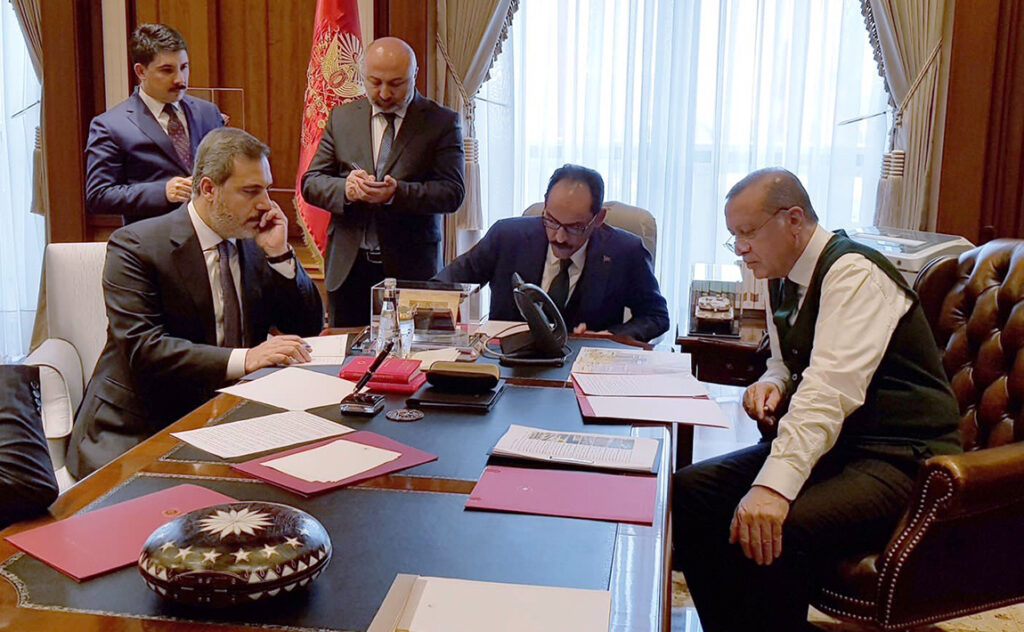Türkmen Terzi
Turkish President Recep Tayyip Erdoğan was sworn in for a third term in office and announced his new cabinet earlier this month, pivoting towards a security-centric, proactive foreign policy approach in the MENA region. The notable appointments include Hakan Fidan, previously the Turkish spy chief, now taking up the mantle of the country’s foreign minister, and Erdogan spokesman İbrahim Kalın transitioning to the role of the new head of the intelligence agency. The political journey of both Fidan and Kalın intersects with Turkish Islamists who have shown robust support for Iran’s Islamic Revolution, potentially hinting at the future direction of Turkey’s foreign policy.
During his tenure at the National Intelligence Organization (MİT) since 2010, Fidan steered the agency through significant transformations. The integration of the latest technology and broad expansion of the institution under his leadership played a crucial role in Turkey’s military and diplomatic engagements in such places as the Caucasus, Ukraine, Syria and Libya. As the Justice and Development Party (AKP) pursues its pragmatic foreign policy, Fidan’s new role may involve securing political or military victories against neighboring countries, which could serve as a distraction from Turkey’s internal issues, in particular economic crises and high rates of inflation.
However Fidan, despite being Turkey’s top diplomat, has always been a mysterious figure, rarely interacting with the media. This, coupled with his rapid ascension from a noncommissioned officer in the Turkish army to the head of a security institution — a trajectory unheard of in the Turkish bureaucracy — has left many unanswered questions. His close association with politicians such as former interior minister Beşir Atalay and former prime minister Ahmet Davutoğlu, who are believed to be sympathetic towards Iran, only adds to the intrigue.
Meanwhile, Turkey’s new spy chief Kalın has consistently emphasized the importance of Iran as a neighbor for Turkey. Kalın’s educational background and affiliations align him with figures like Davutoğlu and other Islamist politicians. These ties, along with his tenure as general coordinator of SETA, an AKP think tank founded by Davutoğlu, suggest a continuity in the policy approach.
Against the backdrop of Turkey’s Sunni-dominated political culture, figures like Davutoğlu, Fidan and Kalın have shown a considerable amount of sympathy towards Shiite Iran, a surprising stance considering the historical power struggle between Turkic and Iranian entities in the region. This attitude reinforces Davutoğlu’s foreign policy mantra of “Zero problems with neighbors,” which strongly advocated improved relations with Iran.
It’s noteworthy that a leaked recording from 2014 features Fidan proposing a contentious approach towards Syria. However, in his current role, he seems more inclined towards fostering peace with the Assad regime. Despite the AKP’s apparent shift towards a more aggressive foreign policy — visible through the occupation of northern Syrian cities, an increased military presence in northern Iraq and involvement in conflicts in the Caucasus, Ukraine and Libya – the direction in which Kalın and Fidan might steer Turkey’s foreign policy remains uncertain.
While it is still too early to make definitive predictions, Iranian Foreign Minister Hossein Amir-Abdollahian’s quick and enthusiastic response to Fidan’s appointment as foreign minister suggests a potentially favorable turn in Iran-Turkey relations.

